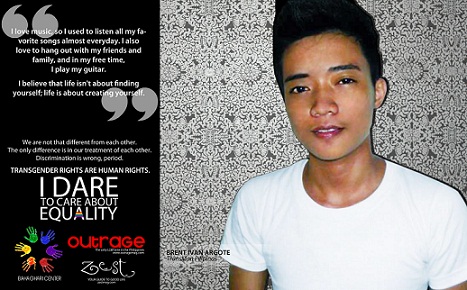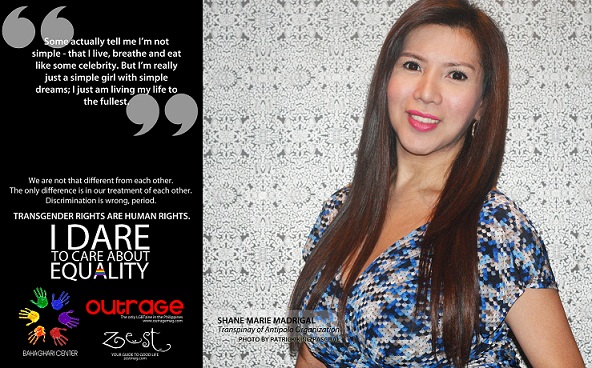By PATRICK KING PASUCAL
ON Nov. 20 the lesbian, gay, bisexual and transgender (LGBT) community and their allies around the world will commemorate Transgender Day of Remembrance (TDoR) in honor of people killed due to anti-transgender hatred and prejudice.
Here in the Philippines, a photographic campaign, called “No different,” has been mounted by Bahaghari Center for LGBT Research, Education and Advocacy and Outrage Magazine to mark TDoR 2012.
The photographic campaign was joined by different transgender (TG) organizations in the country. The 30 participants seek to end transphobia (or the fear of or hostility towards transgenders) in the Philippines and to raise awareness that they are not different from other people.
Over 140 cases of transphobia-related crimes have been recorded since 1984, according to Pink Watch—an LGBT hate crime watch. Furthermore, there have been various cases of discrimination against LGBTs recorded by different nongovernment organizations ( Ex. Some LGBTs were discriminated during job applications, some expelled from schools, and some prohibited from entering establishments in Makati restaurants and bars).
“Truly, it is easier to hate us when you don’t see us,” said Michael David Tan, Bahaghari Center executive director and Outrage Magazine editor. “We continue to be cast as ‘others’, so that the discrimination we experience are given justification. This is, at least, the excuse of those who keep claiming that we want ‘special rights’, even if we’re only after equal rights.”
Transgender is a term that refers to people whose gender identification and expression don’t fit what have been culturally associated with their assigned sex at birth. The TG community is composed of cross dressers, drag kings, drag queens, butches, femmes, genderqueer, intersex and transsexuals.
The observance of TDoR is intended to remind everyone that violence in the TG community is still happening and that the government should give enough attention to the problem.
TDoR was originally conceived in response to the murder of Rita Hester in Allston, Massachusetts on Nov. 28, 1998. Hester was an African-American transgender, who was brutally killed because of transphobia.
 The annual commemoration was begun in 1998 by Gwendolyn Ann Smith, a transgender graphic designer-columnist activist. From a web-based project, TDoR has evolved into an international day of action, observed in more than 20 countries including the Philippines.
The annual commemoration was begun in 1998 by Gwendolyn Ann Smith, a transgender graphic designer-columnist activist. From a web-based project, TDoR has evolved into an international day of action, observed in more than 20 countries including the Philippines.
“This campaign helps promote the visibility of the transgender community in the Philippines and the issues that we face,” said Naomi Fontanos, founder of Gender and Development Advocates (GANDA) Filipinas. “Up to now, transgender people worldwide remain vulnerable to the most heinous forms of gender-based discrimination and hate violence. As TDoR shows, hundreds of transgender people are brutally murdered each year at a rate that has not been observed in other sectors of society.”
“This November 20, GANDA Filipinas takes the occasion of TDoR to call on governments of the world particularly those in the ASEAN to do more for and care more about their transgender citizens. Our lives have value and we, too, deserve dignity,” Fontanos added.
Nil Nodalo, vice chairman of TransMan Pilipinas, said: “We want to stand up for transmen rights. We want the Filipinos to know that we exist. That we’re also human beings like them. They only know “girl, boy, bakla, tomboy” and I think it’s about time to let them know that transman is different from a lesbian or a butch lesbian. We identify ourselves as male but we are female assigned at birth, we undergo hormone replacement therapy and surgeries to match our gender identity.”
“We want to have equal rights in the TG community. We want to be heard though coming out in public is never easy and it never will be,” Nodalo said.
Until now, there is no law that protects the welfare of the LGBT community in the Philippines. Still pending is the Anti-Discrimination Bill that promises to end the discrimination and indifference the LGBTs are facing. Among other things, it seeks to ban discrimination in the workplace, schools, government service and public access areas.
Commissioner Coco Quisumbing of the Commission on Human Rights said that one of the main reasons why the bill hasn’t moved forward is because some congressmen and senators, like Sen. Vicente Sotto, wanted to update the House version of the bill with the exclusion of the LGBT provisions.

